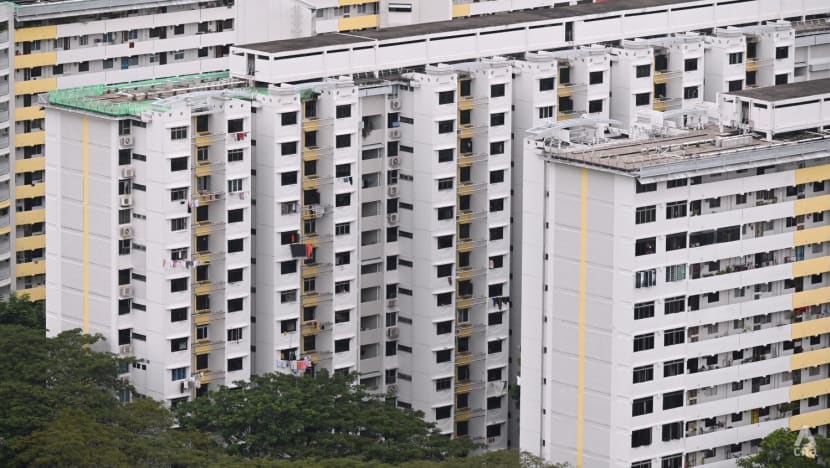HDB's annual deficit increases to more than S$4 billion, highest since inception of public housing
The largest portion of deficit was incurred under the Home Ownership segment, which covers the development and sale of flats, and disbursements of housing grants.

HDB flats in Singapore. (Photo: CNA/Gaya Chandramohan)
SINGAPORE: The Housing and Development Board (HDB) reported a record deficit of around S$4.37 billion in the 2021 financial year, arising largely from the development, sale of flats and grants disbursed for new and resale flats.
The deficit in FY2021 is 86 per cent higher than FY2020, HDB said in a press release on Monday (Oct 31) for its FY2021/FY2022 annual report, which covers the period of Apr 1, 2021 to Mar 31, 2022.
This is the highest deficit recorded since the inception of public housing in 1960.
Of the nearly S$4.37 billion deficit recorded for FY2021, S$3.85 billion was incurred for the Home Ownership segment, which includes the expected loss for flats currently under development, gross loss on the sale of flats and the disbursement of Central Provident Fund (CPF) housing grants.
The S$3.85 billion is nearly double the S$1.95 billion deficit recorded in FY2020 in the same segment.
HDB's "substantial deficit" under its Home Ownership Programme shows its commitment to ensure that public housing remains "affordable, accessible, and inclusive", said Minister for National Development Desmond Lee.
Keeping public housing affordable and accessible, to meet the housing aspirations of Singaporeans and to help Singaporeans own their home, is a key national priority, he added.
"That is why we continue to build and sell new HDB flats at prices below the market, increasing our market subsidies over this period to keep BTO prices relatively stable, and also provide housing grants to eligible buyers of both new and resale flats."
On prices of new flats, Mr Lee previously said in Parliament that these were not based on cost.
HDB establishes the flats' market value by considering prices of comparable resale flats, the individual attributes of the flats and prevailing market conditions, Mr Lee said earlier this month in response to a question about the estimated development loss from the Central Weave @ Ang Mo Kio Build-to-Order (BTO) project.
To derive the selling prices, HDB applies a significant subsidy to the assessed market values to ensure that new flats are affordable to those buying their first home. A deficit is incurred as the amount collected from the sale of flats is lower than the cost of building and housing grant disbursements.
DEFICIT UNDER HOME OWNERSHIP PROGRAMME
In FY2021, there was a net increase of about S$2.26 billion in the provision for expected loss for flats under development, which was in part due to the commencement of more new development projects and the accompanying subsidies and housing grants provided for those projects, HDB said in its press release.
The deficit was also attributed to the assistance measures for contractors to help ease their financial pressures as well as measures to address the disrupted supply of building materials brought about by border restrictions - both of which are due to the pandemic.
HDB noted that construction costs have risen by about 30 per cent since FY2019, and that it had largely absorbed those costs.
In addition, more CPF housing grants were disbursed to eligible buyers in FY2021. According to HDB, S$849 million of CPF housing grants were disbursed to eligible buyers of resale flats and Executive Condominiums that year, up from S$791 million in FY2020.
HDB said there had been larger subsidies given out for its housing programme and CPF housing grants to keep new flats affordable, as seen from the "widening deficits" it incurred over the past two years.
"Most first timer buyers therefore use less than a quarter of their monthly income to service their housing loans, and close to 90 per cent of first-timer families service their HDB loans using CPF with little or no cash payments," it added.
There was also a higher gross loss of S$659 million for sales completed in FY2021, up 85 per cent from FY2020. This was due to higher number of sales completed, with 13,506 units in FY2021 compared to 8,124 units in the previous financial year.
Separately, HDB noted a deficit of S$121 million incurred from the rental of HDB flats to eligible tenants under rental housing schemes, with S$3.6 million written off for irrecoverable arrears in FY2021.
SUPPORT MEASURES FOR HOMEOWNERS
HDB also provided financial assistance to homeowners and shop tenants in FY2021 to "help tide them through the challenging year".
Financial assistance amounting to S$15 million was offered to those in mortgage and upgrading cost arrears, which included the suspension of late payment charges.
Support was also provided to heartland businesses, with HDB waiving rentals that amounted to S$115 million.
DEFICIT FROM REJUVENATION AND UPGRADING PROGRAMMES
HDB incurred a deficit from rejuvenating towns and flats as well as from the provision and management of facilities, such as carparks in housing estates and works to drains and mechanical works.
In FY2021, HDB said it incurred a S$392 million deficit for its upgrading programmes, up from the S$242 million deficit in the previous financial year.
The increase in deficit was a result of the higher expenditure on the Home Improvement Programme (HIP) as construction work picked up with the gradual easing of pandemic restrictions.
A total of 53,792 flats were upgraded under the HIP in FY2021.
Six Neighbourhood Renewal Programme projects were also announced, with another six projects completed.
Another S$352 million deficit was recorded for residential ancillary functions in FY2021, compared to the S$307 million deficit in FY2020. These included the provision and management of facilities such as the carparks in housing estates, and cyclical works like the reconstruction of drains, and repair and replacement of mechanical and electrical works.
MEETING HOUSING DEMAND
HDB said it will continue to provide public housing that is affordable and accessible for Singaporeans.
It also said it is ramping up the supply of BTO flats to meet a "strong housing demand", with plans to launch up to 23,000 flats per year in 2022 and 2023, which is an increase of 35 per cent from the 17,000 flats launched in 2021.
"This means that not only will more buyers be able to secure their BTO flats, and in a wider range of locations, they will also be able to select from a larger pool of flats that meet their budgets," HDB said, adding that it is also prepared to launch up to 100,000 flats in total from 2021 to 2025 if needed.
















